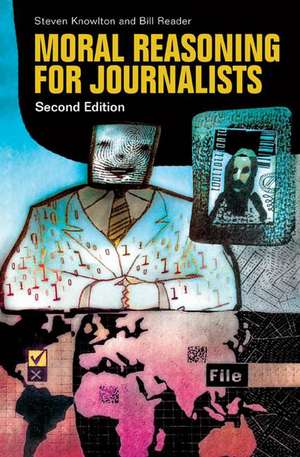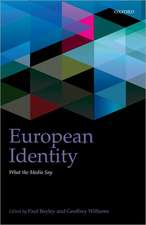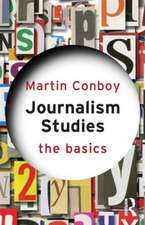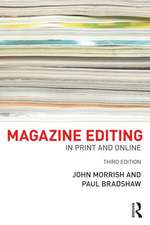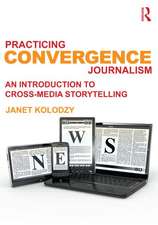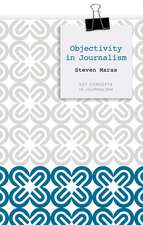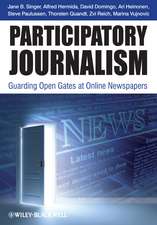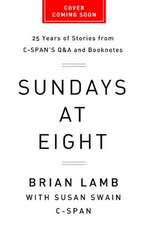Moral Reasoning for Journalists
Autor Steven Knowlton, Bill Readeren Limba Engleză Paperback – 22 dec 2008 – vârsta până la 17 ani
| Toate formatele și edițiile | Preț | Express |
|---|---|---|
| Paperback (1) | 232.07 lei 6-8 săpt. | |
| Bloomsbury Publishing – 22 dec 2008 | 232.07 lei 6-8 săpt. | |
| Hardback (1) | 438.24 lei 6-8 săpt. | |
| Bloomsbury Publishing – 22 dec 2008 | 438.24 lei 6-8 săpt. |
Preț: 232.07 lei
Preț vechi: 297.75 lei
-22% Nou
Puncte Express: 348
Preț estimativ în valută:
44.42€ • 48.27$ • 37.34£
44.42€ • 48.27$ • 37.34£
Carte tipărită la comandă
Livrare economică 21 aprilie-05 mai
Preluare comenzi: 021 569.72.76
Specificații
ISBN-13: 9780313345500
ISBN-10: 0313345503
Pagini: 264
Dimensiuni: 156 x 235 x 23 mm
Greutate: 0.41 kg
Ediția:2
Editura: Bloomsbury Publishing
Colecția Praeger
Locul publicării:New York, United States
ISBN-10: 0313345503
Pagini: 264
Dimensiuni: 156 x 235 x 23 mm
Greutate: 0.41 kg
Ediția:2
Editura: Bloomsbury Publishing
Colecția Praeger
Locul publicării:New York, United States
Notă biografică
Steven Knowlton is Professor of Journalism at Dublin City University. He has 18 years of professional newspaper experience, and continues to freelance for the New York Times and other major newspapers. He is the author/editor of six books, including the first edition of Moral Reasoning for Journalists, The Journalist's Moral Compass (with Patrick R. Parsons) and most recently (with Karen L. Freeman), Fair and Balanced: A History of Journalistic Objectivity.Bill Reader is Assistant Professor in the E.W. Scripps School of Journalism at Ohio University, where he teaches journalism reporting, writing, editing, and ethics. He has a decade of professional newspaper experience, most recently as opinion page editor of the Centre Daily Times in State College, Pennsylvania. His research of journalism ethics issues has been published in Newspaper Research Journal and Journal of Mass Media Ethics, and he contributes to trade publications including Quill, The Masthead, and Grassroots Editor.
Cuprins
ForewordPrefaceA Note to Our Fellow JournalistsPart I. Locating Ethical Journalism in the Western Tradition1. Introduction to Ethical Thinking2. The Political Case for Moral Reasoning in Journalism3. The Philosophical Case for Moral Reasoning in Journalism4. The Economic Case for Moral Reasoning in Journalism5. The Principles of Ethical Journalism6. Solving Moral Dilemmas on Deadline: Balancing Competing ElementsPart II. Case Studies: The Principles in Play on the Front Lines7. Objectivity vs. Bias: How Close Is Too Close When The Subject Is A Little Girl?8. Objectivity vs. Bias: Keeping Cool When You Get a Hot Quote9. Objectivity vs. Bias: A Reporter With AIDS Depth of Understanding or Obvious Bias10. Fairness and Balance: The hostile interview: What Sets 'Real' Journalism Apart from 'Fake' News11. Fairness and Balance: A Candidate's Past12. Fairness and Balance: When A Journalist Balks at .13. Conflict of Interest: The Graffiti Artists: Turn 'Em In, Get the Story, Or Both?14. Conflicts of Interest: When your own newspaper is in the news15. Conflicts of Interest: Primary Authorship: Can You Lie about Your Day Job?16. Privacy vs. The Public's Right to Know: Private Citizens in the Courts: When to Name Names17. Privacy vs. The Public's Right to Know: Sex in an Elevator: Legitimate News or Sophomoric Titillation?18. Privacy vs. The Public's Right to Know: Suicide: Important News or a Grotesque Invasion of Privacy?19. Sensitivity vs. Responsibility to Inform: Offensive Cartoons: Inciting Anger or Inspiring Serious Debate?20. Sensitivity vs. Responsibility to Inform: When journalists put themselves in harms way21. Sensitivity vs. Responsibility to Inform: The Grisly War Photo: Powerful Information, but What about Taste?22. Verification and Attribution: 'Memogate': The Reporting Scandal that Trumped the Real Story23. Verification and Attribution: Anonymous sources from Deep Throat to the Clinton-Lewinski affair24. Verification and Attribution: Anonymity in Feedback from the Public How 'Open' Should Forums Be?25. Avoid Deception: The Casting Couch: Is entrapping a libidinous actor serious news or simply a ratings stunt?26. Avoid Deception: Is It OK to Use Deception to Reveal Shady World Politics?27. Correction and Clarification: The Brilliant Student with A Dark Past: How Much is Relevant In Follow-up Reports?28. Correction and Clarification: Fact-checking Candidates' Claims on the Campaign TrailConclusion: What is a Journalist?Bibliography
